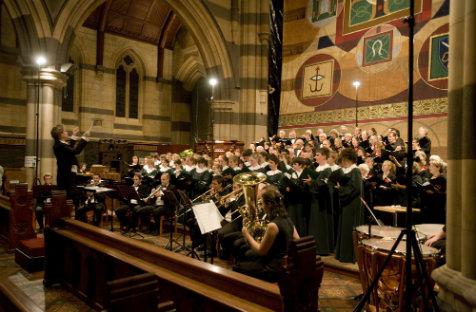For those who wish to hear superb Christmas music and participate in full-voiced carol singing, without feeling intimidated by the threat of exposure of limited vocal talents, the Royal Melbourne Philharmonic provides an ideal opportunity. This year, the popularity of their traditional annual ‘Carols in the Cathedral’ has necessitated expanding the number of concerts given from two to three. Even so, the cathedral was full of people of all ages, many of whom had been willing to queue outside for a considerable length of time.
The Brass Consort heralded in the entry of the adult choirs with Holst’s ‘Christmas Day’. This rousing beginning, as well as most of the many contributions of the Brass Consort, depended on secure, finely produced trumpet work. Andrew Wailes then urged the audience to treat the evening as a concert rather than a service, despite the splendor and religious nature of St Paul’s. Enthusiastic applause and active participation were encouraged, and given.
The Australian Children’s Choir processed up the aisle singing ‘Once In Royal David’s City’ and the audience joined in. Three choirs, brass, and an organ at full throttle were more than enough to evoke heartfelt participation. Interspersed throughout the program were seven more carols, all traditional with the exception of the well-known Australian carol ‘Christmas Day’ by W G James. For some of the carols, the soaring descants provided by the choirs’ sopranos were particularly thrilling. Tenors and basses were notable for their earnest vigor, doubtless giving encouragement to male members of the audience.
Expressive readings by Roland Rocchiccioli and Julie Houghton were thoughtfully integrated into the musical selections, adding further variety and interest to the program. Although the music of John Rutter was featured, particularly his cantata, ‘Dancing Day’, a wide variety of appealing music was performed in various combinations of the choirs and instruments. The Australian Children’s Choir was joined by Jacinta Dennett on the harp for several of Rutter’s pieces, making an ideal combination for this lovely music as well as for the occasion itself. The singing was fresh and disciplined and Dennett played in true angelic style.
More angelic music emanated from a radiant Siobhan Stagg. Dressed in emerald green and standing in the pulpit, she sang a range of beautiful Christmas music, beginning with Rutter’s ‘Angelus ad virginem’ and ending with ‘This Christmastide’, which was written for the great soprano Jessye Norman. Along the way, she gave a sublime account of Adam’s ‘O Holy Night’ and Brahms’ ‘Wiegenlied’. This was Christmas music at its best. My only reservation lay in the use of amplification. Siobhan Stagg’s voice carries very well and does not need the interference and, in this case, slight distortion that amplification brings. From where I was sitting the piano appeared not to be amplified, thus making the work of two very talented pianists appear comparatively pale and underpowered.
If the soul of Christmas music is in the voice, then the combined efforts of these choirs and soloist provided substantial spiritual nourishment. Andrew Wailes has once again inspired his forces to provide a significant contribution to our Christmas celebrations.
Rating: 4 stars out of 5
Royal Melbourne Philharmonic Choir
Melbourne University Choral Society
The Australian Children’s Choir
RMP Brass and Percussion
Siobhan Stagg, soprano
Jacinta Dennett, harp
Jonathan Bradley, organ
Amir Farid and Stefan Cassomenos, piano
Roland Rocchiccioli and Julie Houghton, readers
Andrew Wailes, conductor
St Paul’s Cathedral, Melbourne
21 December





